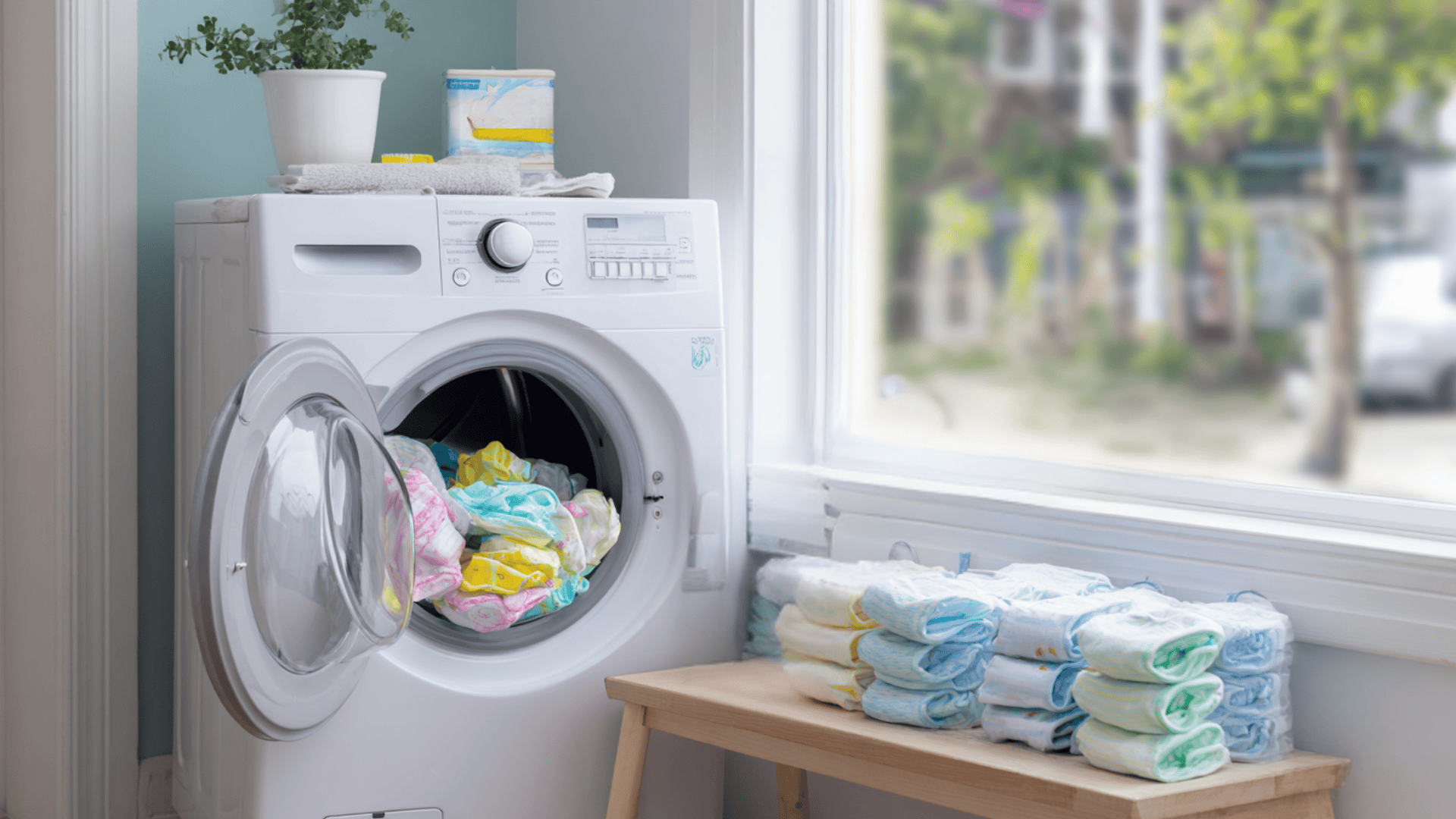Cloth Diaper Wash Routine: Step-by-Step Guide

Getting your cloth diaper wash routine right makes all the difference for you and your baby.
When you nail down the basics, you’ll save money, keep baby comfortable, and avoid those dreaded leaks and smells. A good routine also means your diapers will last through multiple kids.
Many new parents worry that cloth diapers are too much work or too complicated. The truth is, once you have your system down, it becomes second nature.
You’ll spend just a few extra minutes each day for huge savings and a healthier planet.
This guide walks you through everything you need to know. We’ll cover the best washing steps, what supplies to buy, and how to avoid common mistakes that can ruin your diapers.
Understanding Cloth Diaper Materials
Not all cloth diapers are made the same way. The type of fabric affects how you should wash it and how long it’ll last.
Natural fibers like cotton, bamboo, and hemp are super absorbent and get softer with each wash. They can handle hot water and strong agitation without falling apart.
These materials are great for heavy wetters and overnight use.
Synthetic materials like microfiber dry faster and are often cheaper. But they can hold onto smells and detergent buildup more easily.
Many modern diapers mix both types of fibers. This gives you the benefits of both – good absorption and quick drying. Check your diaper tags to see what materials you’re working with so you can adjust your routine accordingly.
Step-by-Step Wash Routine for Cloth Diapers
This simple routine will keep your cloth diapers clean, fresh, and lasting for years. Follow these steps every 2-3 days for best results.
Step 1: Remove Solids

Start by getting rid of any solid waste before it goes in your diaper pail. For breastfed babies, you can toss poopy diapers straight in since their waste is water-soluble.
Once the baby starts eating solid foods, you’ll need to dump or spray off the chunks. Use a diaper sprayer, disposable liner, or the old “dunk and swish” method in the toilet.
Don’t stress about getting every last bit – your washing machine can handle small traces.
Note: Store dirty diapers in a dry pail or large wet bag until wash day. Never soak them in water as this makes bacteria grow faster and creates worse smells.
Step 2: Pre-Rinse / Pre-Wash

Before your main wash, run a cold water rinse or short wash cycle. This removes most of the urine and leftover waste particles. You can skip detergent here or use just a tiny amount.
Some people prefer a warm pre-wash, especially for really soiled diapers. Either temperature works fine – the key is getting that first layer of soil out before the main event.
Step 3: Main Wash

This is where the magic happens. Use hot water between 130-140°F if your machine allows it. Hot water kills germs and breaks down oils and proteins that cause smells.
Add your cloth diaper-safe detergent according to the package directions. Don’t pack your machine too full – diapers need room to move around and get clean.
Run a normal or heavy-duty cycle depending on how dirty your diapers are. The agitation helps work the detergent through all the layers and gets everything truly clean.
Step 4: Extra Rinse

After your main wash, run one more rinse cycle to remove any leftover detergent. Soap residue can irritate a baby’s skin and make diapers less absorbent over time.
Check your final rinse water; it should run clear with no bubbles. If you still see suds, run another rinse. It’s better to over-rinse than under-rinse when it comes to a baby’s comfort.
Step 5: Drying

Air drying is best for making your diapers last longer. Hang them on a line or drying rack, preferably in sunlight. The sun naturally bleaches out stains and kills any remaining bacteria.
If you need to use the dryer, stick to low heat. High heat can damage the waterproof layer and break down the elastic over time.
Remove covers and anything with snaps or velcro as soon as they’re dry to prevent melting.
Essential Supplies for Washing Cloth Diapers
You don’t need tons of fancy equipment to wash cloth diapers well. Here are the basics that will make your life easier.
| Supply | Purpose / Notes |
|---|---|
| Dry pail or large wet bag | For storing dirty diapers, a mesh liner allows easy transfer to the washer |
| Cloth diaper-safe detergent | Free of softeners, fragrances, and bleach to protect diapers and baby’s skin |
| Diaper sprayer | To rinse off solid waste directly into the toilet |
| Soft bristle brush | Useful for spot treating stains before washing |
| Laundry booster | Helps with cleaning in hard water areas; check compatibility with detergent |
| Drying rack or clothesline | Air drying is preferred to preserve diaper materials and elasticity |
The key is choosing products that work with your setup and budget. A simple plastic bucket with a lid works just as well as fancy diaper pails if that’s what you have on hand.
Common Mistakes to Avoid
Learning from other parents’ mistakes can save you time and frustration. Here are the biggest pitfalls to watch out for when washing cloth diapers.
- Don’t soak dirty diapers in water – this makes bacteria grow and creates worse smells
- Avoid cramming too many diapers in one load – they need space to get clean properly
- Use the right amount of detergent – too little won’t clean, too much causes rashes
- Never use fabric softener or dryer sheets – they make diapers less absorbent and leaky
- Always wash in hot water for main wash – cold water can’t kill germs effectively
Following these simple rules will keep your cloth diapers clean, fresh, and working properly. Your baby will stay comfortable and you’ll avoid common washing problems.
Advice from Experienced Parents
Real parents who’ve been through the cloth diaper journey have great tips to share. Here’s what works in the real world.
Parents recommend getting an extra wet bag for diaper changes when you’re out and about. Having a backup saves you from washing just one or two diapers when you get home.
Veteran cloth diaper users swear that sunlight really does work magic on stains. Even in winter, hanging diapers by a sunny window helps keep them bright and fresh. Natural bleaching beats harsh chemicals every time.
Most experienced parents say not to stress if you’re not perfect at first. Cloth diapers are tougher than you think, and you’ll figure out what works for your family pretty quickly.
Check manufacturer websites when you run into problems. Chances are, someone else has dealt with the same issue and found a simple solution.
Tips to Make Cloth Diapers Last Longer
With good care, quality cloth diapers can last through multiple children. Here are simple ways to get the most life out of your investment.
- Buy quality diapers – Well-made diapers from trusted brands use strong materials and good construction that hold up to repeated washing.
- Air dry when possible – Protect the waterproof layer and elastic by line drying or using low heat in the dryer.
- Rotate your stash – Having enough diapers means each one gets a break between wears, preventing excessive wear on any single diaper.
- Fix problems quickly – Check regularly for loose snaps, worn elastic, or small tears and repair them before they get worse.
- Store properly – Keep clean diapers in a cool, dry place away from direct sunlight when not in use.
Conclusion
Getting your cloth diaper wash routine down pat makes everything else so much easier.
With the right supplies, a simple step-by-step process, and tips from parents who’ve been there, you’ll have clean, fresh diapers that last for years.
The key is staying consistent with your routine and not overthinking it. Remove solids, store dry, rinse cold, wash hot with good detergent, rinse again, and air dry when possible. This basic formula works for most families.
Remember that cloth diapering saves money, reduces waste, and keeps harsh chemicals away from your baby’s skin. A little extra work upfront pays off in comfort, health, and savings down the road.
What’s your biggest cloth diaper washing challenge? Share your questions or tips in the comments below; we’d love to hear what works for your family.
Frequently Asked Questions
Why Do My Diapers Still Smell After Washing?
This usually indicates detergent buildup; try an extra-hot rinse or switch to a different detergent.
What Should I Do If My Diapers Stop Absorbing Well?
Check for fabric softener residue or mineral buildup from hard water and consider a stripping routine.
How Can I Prevent Leaks With Cloth Diapers?
Make sure the diaper fits properly around legs and waist, and adjust the absorbency inserts as needed.






